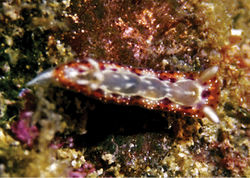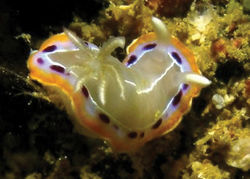Chromodoris decora
| Notice: | This page is derived from the original publication listed below, whose author(s) should always be credited. Further contributors may edit and improve the content of this page and, consequently, need to be credited as well (see page history). Any assessment of factual correctness requires a careful review of the original article as well as of subsequent contributions.
If you are uncertain whether your planned contribution is correct or not, we suggest that you use the associated discussion page instead of editing the page directly. This page should be cited as follows (rationale):
Citation formats to copy and paste
BibTeX: @article{Yonow2012ZooKeys197, RIS/ Endnote: TY - JOUR Wikipedia/ Citizendium: <ref name="Yonow2012ZooKeys197">{{Citation See also the citation download page at the journal. |
Familia: Chromodorididae
Genus: Chromodoris
Name
Chromodoris decora (Pease, 1860) – Wikispecies link – Pensoft Profile
- Doris decora Pease, 1860: 29 (Hawaii) and illustrated by Bergh 1880[1]: 25, pl. B figs. 5-8.
- Chromodoris decora. – Rudman 1986: 329, figs. 1, 9-11 (Christmas Island (Indian Ocean), Australia, New Caledonia); Debelius and Kuiter 2007: 149 (Oman, Sri Lanka + W Pacific).
Material
Maldives: 10 mm (8 × 3 mm pres.), 12 m depth, Banana Reef, North Malé Atoll, 19 November 1995, leg. SG Buttress & RC Anderson (“dorsal surface creamy green with white dots, spots, and faint lines; margin orange with purple spots and white dots; larger purple spots inside margin; rhinophores and gills cream”). – Oman: photographs of one individual, Muscat, 01-12 April 2009, S Kahlbrock. – Sri Lanka: photographs of one individual, Unawatuna, S of Galle, 28 December 2010, S Kahlbrock.
Description
The single specimen is accompanied by a photograph reproduced here (Plate 41) and is not of the typical colour pattern. The white lines were represented by a series of dots and dashes, forming an irregular scalloped line around the central dorsal hump, contiguous to an orange band containing larger purple spots and smaller white dots. Purple spots coalesced to form small patches. Some white dots and dashes within this central region, but only vaguely indicate a median. The five simply pinnate gills, rhinophores, and top of the tail all bore opaque white markings: the gills and the rhinophores as a core, and the tail as a white band centrally tapering on the long metapodium. Two individuals photographed in Oman and Sri Lanka have an identical pattern of distinct marginal bands of orange and lilac, the lilac bearing rounded purple spots (Plate 42). There is one white line dorsally splitting around the branchial pocket. One photograph shows the red-violet spots located between the foot and the hyponotum, characteristic of this species.
The preserved specimen is well extended but badly preserved. It is translucent white, and the black digestive gland is visible through the thin epidermis, as is the white intestine loop. The translucent white metapodium is long and pointed.
Distribution
This is the first literature record of the species from the western Indian Ocean. There have been photographs made available on Sea Slug Forum[2] and NudiPixel[3] only from Sri Lanka, with all other records being further east from Christmas Island and the western Pacific.
Taxon Treatment
- Yonow, N; 2012: Opisthobranchs from the western Indian Ocean, with descriptions of two new species and ten new records (Mollusca, Gastropoda) ZooKeys, 197: 1-130. doi
Other References
- ↑ Bergh L(1880) Malacologische Untersuchungen, 2. In C. Semper, Reisen im Archipel der Philippinen 4 (1): 1–78.
- ↑ Sea Slug Forum website http://www.seaslugforum.net/
- ↑ NudiPixel website http://www.nudipixel.net/
Images
|

